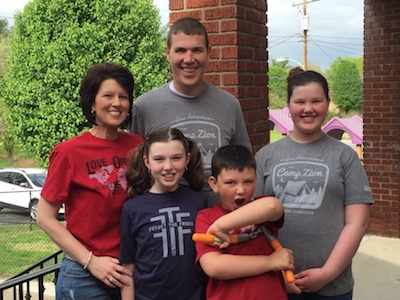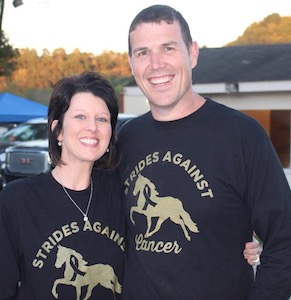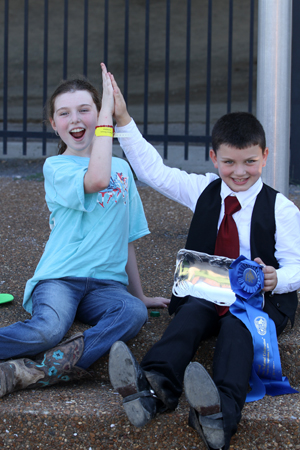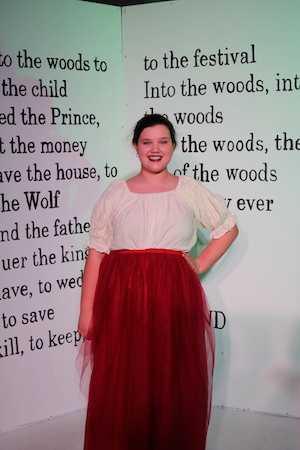By Sadie Fowler
When the Bullock family arrived in Middle Tennessee for one of their approximately four annual summer trips, you’d never know there was so much competition on the horizon. They were genuinely happy to be at the barn; present in the moment and focused on normal things any family would focus on during a weekend away.
“Dad, when can we eat?” asked one of the children.

“Can we go to Walmart? Are we eating at Ruby Tuesday’s or Zaxby’s?” asked the other. “Dad … I’m hungry!”
The children’s dad, Dr. David Bullock, just laughed as he patiently visited with folks at the barn in Columbia, Tennessee (where their horses were stabled during a weekend of Tennessee horse shows) while subtly assuring the kids that both of their requests would soon enough be granted.
Dr. Bullock of Mt. Vernon, Kentucky has been a passionate enthusiast of the Tennessee Walking Horse industry for years, following in the footsteps of his own family, in particular his father. His family’s early influences are rooted back to Donald Stamper, who provided a great foundation in a family environment that got the family hooked on walking horses.
David has passed the horse bug down to his own children and, together, they show horses as their favorite past-time together. They ride under the direction of the Hankins family, Jamie, Jennifer and Claire Hankins; as well as Ryan Blackburn, who trains their performance mounts.
“The biggest reason we do this is, and what I love most about it, is the family aspect of it,” said David, a doctor who practices family medicine in his native Bluegrass state. “It’s spending time together around like-minded people. It’s not only the horses, but the fun we have. I love watching the kids have a good time; it’s the hot dogs, the ice cream, the friendships they develop, and the discipline they’re learning … Jennifer has made them both great riders. They’ve learned sportsmanship through all this.”

David, a patient and laid-back man who’s in it for all the right reasons, delights in showing himself as well as watching two out of his three kids indulge in the sport. He loves that they both have such different personalities when it comes to horses and encourages them both to excel in their own way. While his oldest daughter Bailey pursues other hobbies, Davany, 11, and Zane, eight, are all about the Tennessee Walking Horse, for a variety of reasons.
“They (Davany and Zane) are both so different when it comes to the horses,” David said. “Davany loves each horse for who it is. She doesn’t care if they win or lose. She loves them all. Zane was always a natural at riding and is also really competitive. He has ‘grit’ and never backs down.”
All three of the Bullock riders have had plenty of success in the show ring, with great contenders over the years including, Uptown Funk, I’m A Little Funky, Righteous Ritz (a horse they bred), GiGis American Girl, He’s Remington, Eubank, Attaway José, Volatile, I’m King James, Gigi’s Blue Ribbon Ride, José’s Jaycie, among others.
Davany echoes her dad’s sentiments as she is the first of the bunch to excitedly chime in when the family is asked what they love most about their horse hobby.
“I like showing Righteous Ritz the most in the juvenile pony division, but overall, my favorite is Uptown Funk,” she said. “I spent my own money on that horse — my entire life savings.”
When Davany is not riding, she enjoys other hobbies as well, including art. When she gets older she wants to be an artist. Her back up plan is to become a doctor like her father.
“When Davany was first learning to ride she questioned Jennifer as to why she had to do things a certain way,” David laughed. “In the end it has been so worth it as she is often commended for the way she sits on a horse and rides.”
Zane, who wants to be a trainer, police officer or zookeeper when he grows up, says his favorite memory from the show ring was when he won at the Celebration — it was only his second time showing. He admits he was disappointed that he didn’t show back in the championship that year.
“I was upset because they wouldn’t let me,” he said. “I know I could have won!”
David, who is part of his family’s medical practice that includes a ventilator clinic, is able to take frequent breaks from working at the clinic or the emergency room, thanks in part to their practice being a family clinic. He has two other partners, one of whom is his sister.
In both work and life, family is something that matters greatly to David. In fact, he’s able to draw several parallels between his career in medicine and his pursuit of sharing his passion for horses with his own children.

“Both involve compassion and commitment,” he said. “If you don’t have either of these traits you can’t do either horses or medicine well.”
David’s father loved horses and David says he and several of his siblings took to horses early in life when his father exposed them as a result of family trail rides and pleasure rides on the Kentucky countryside. There were seven siblings in total, four boys and three girls, and three of the Bullock siblings inherited the horse gene.
There have been prized memories created over the years; and a few tears shed. When David was a kid, his sister passed away in a tragic accident that involved riding. Still, the family was able to pick themselves up after the grief and get back in the saddle. She’d be glad they did.
“I took to it early and have always loved them,” David said. “One of my first and favorite padded horses was Encore Blue.”
David is quick to share his personal favorite memory from the show ring.
“I’d have to say my best moment in the show ring was in 2014, when I won the Novice World Championship on West Point,” he said. “He had been reserve in 2009 and that was my first time showing him at the Celebration. It was special to win it on what I would consider to be one of our first ‘good horses.’”
David’s wife Vanessa, who is a teacher and does not ride, supports the family from afar as David, Zane and Davany hit to the shows about three weekends a month during show season. They tackle the Kentucky circuit most frequently, but nothing beats the few times a year they get to pack up and travel to Middle Tennessee to compete with the industry’s best.
As David, whose favorite world grand champion of the past is The Black Night Shade, reflects on what is enabled them to succeed in the walking horse industry, he says they’ve been able to pursue their hobby relatively inexpensively, in comparison to what many perceive the expense to be. Part of that is because they’ve bred many of their horses.
“By the time I’m gone I will have earned a master breeders award,” he laughed, joking about the number of horses he’s raised. “I really like this aspect of it. Once they’ve been started and are able to spread their wings and excel, it’s really cool to watch.”
Speaking about what he believes the most pertinent needs of the industry are, David says the industry needs to continue building up the momentum it’s gained in recent years. If this happens, he said in another five or six years the industry should be close to where it once was in terms of more entries at shows and greater community support.
“It just takes time,” he said. “People had gotten to a point where things were too uncertain in the industry and they got tired of showing up for their hobby and not knowing for sure how it would end up. As far as the social aspect, it goes hand in hand with the other. People want to come and watch a good show. This will come in time as shows continue to grow and offer more excitement for the spectator in the stands.”
Another challenge to the industry right now, David believes, is the lack of a so-called middle market. He remembers days when there was a horse for everyone. Now, he said the horse world has become almost two-tiered.

“The $25,000 horse has disappeared,” he said. “There’s the high-end and then there’s cheap. It’s a double-edge sword because the good horses have gotten high because people are excited, so that’s a good thing, but...”
Naturally, people spending money on horses want to win so they’re trying to buy those horses that will win, however, that wipes out a large sector of the population from being able to get in the game. There once was a day when horse shows were so big winning was not necessarily an expectation. There was a deeper level of competition and therefore more people, of a variety of income levels, could show and compete.
Again, David finds a solution to some of the great expense of finding great horses who can compete by breeding them himself.
Competing and winning is fun for everyone, including the Bullocks, but David has his priorities in good order and has passed that positive attitude on to his children.
“I suppose the most important lesson we’ve all learned from our experiences in the show ring, which carry on to life, is hard work pays off and persistence is a good thing,” David said.
As much as the blue-ribbon matters, showing horses has given the Bullock family something far greater than the blues: It has kept them close, happy and created a life-time of lasting memories that will never fade.